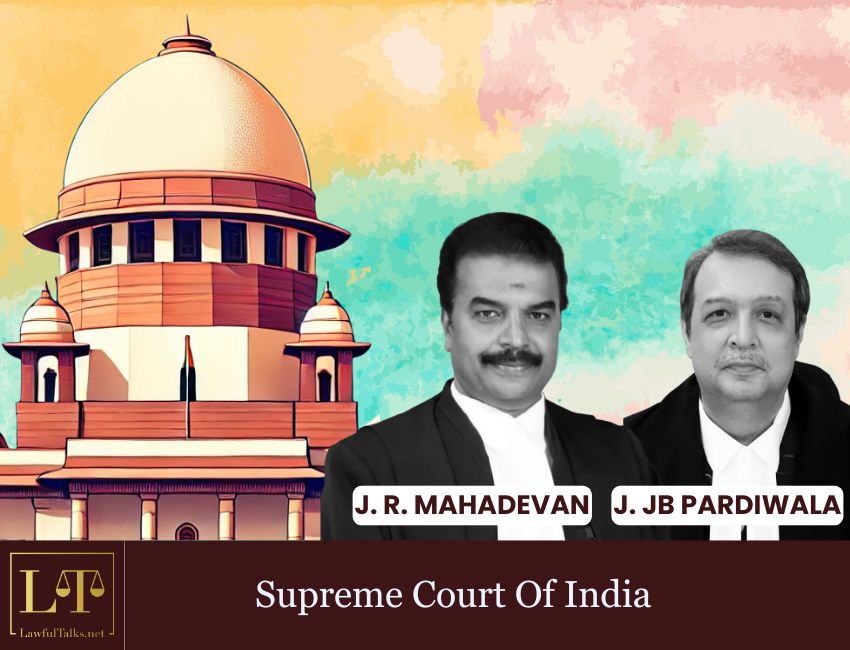Allahabad HC Sets Aside Afzal Ansari's Conviction, Allows Him to Continue as MP

In a landmark pronouncement that reinforces the accountability of constitutional functionaries within a federal democracy, the Supreme Court of India has delivered a judgment with far-reaching implications for Centre-State legislative relations. The judgement addresses, among other issues, the chronic delay by Governors in assenting to State legislation and the corresponding inaction by the President of India under Article 201 of the Constitution.

This case arose from a series of legislative stand-offs in Tamil Nadu, where 12 Bills passed by the State Legislature between January 2020 and April 2023 remained pending before the Governor, who, despite assuming office in November 2021, took no action until November 2023. The State ultimately approached the Supreme Court under Article 32, challenging not just the delay, but also the constitutionality of the Governor’s withholding of assent and subsequent reservation of Bills for the President’s consideration.
The Supreme Court, while interpreting Article 200, held that once a Bill is repassed by the State Legislature in accordance with the first proviso, the Governor is under a constitutional obligation to assent to the Bill. The Court noted that the Governor “shall not withhold assent therefrom” once a Bill has been returned and passed again by the State Legislature with or without amendments. It held that “The role which is ascribed by the first proviso to the Governor is recommendatory in nature and it does not bind the State Legislature.” Therefore, the discretion available to the Governor to reserve a Bill for the President’s consideration exists only when the Bill is presented to him for the first time. The Court clarified that the expression ‘shall not withhold assent therefrom’ constitutes a clear and unequivocal constitutional prohibition against the Governor.
The Court further addressed the issue of the President's powers under Article 201 and imposed a time limit on Presidential action. It observed in paragraph 391 that “the President is required to take a decision on the bills reserved for his consideration by the Governor within a period of three months from the date on which such reference is received.” The Court held that in case of any delay beyond this period, “appropriate reasons would have to be recorded and conveyed to the concerned State.” This requirement, the Court noted, arises from the constitutional imperative of reasoned and timely decision-making. The absence of such reasons may attract judicial scrutiny, as the Court held that, where the President exhibits inaction in taking a decision and such inaction exceeds the time-limit which has been stipulated above, then it shall be open to the State Government to seek a writ of mandamus from this Court.
The Court emphatically held that neither the Governor nor the President is empowered to exercise an “absolute veto” by withholding assent indefinitely. It stated: “While in the preceding paragraphs we have elaborated that the Governor does not hold the power to exercise ‘absolute veto’ on any bill, we see no reason why the same standard would also not apply to the President under Article 201 as well. The President is not an exception to this default rule which permeates throughout our Constitution. Such unbridled powers cannot be said to remain in either of these constitutional posts.”
To strengthen transparency and accountability, the Court laid down that the President is under an obligation to disclose the reasons for withholding assent and that such reasons must be communicated to the State Government. It noted: “The natural corollary of the constitutional abhorrence to the notion of simpliciter withholding of assent within our Constitution is that a requirement and responsibility of assigning reasons to the withholding of assent is cast upon the President. What follows from this is that the reasons assigned by the President for withholding of assent must be communicated to the State government concerned.” The Court further observed that “in the absence of such communication, there exists a real and grave danger of denying the State government the knowledge of the reasons due to which the bill passed by the State legislature had not been assented to.”
The Court also emphasized that the absence of reasons for withholding assent could undermine transparency and judicial accountability. It stated: “We are of the considered view that the expression of intention by the President through a declaration of reasons supporting his actions under Article 201 is of paramount importance, and this Court is not inhibited in any manner to make a presumption that the President and, by extension, the Central Government, have acted in a bona fide manner when it exercises its power of judicial review.”
Acknowledging the need for improved legislative coordination, the Court suggested that States should undertake pre-legislation consultations with the Central Government in matters where Presidential assent is likely to be required. It observed: “Such a practice reduces friction between Centre-State relations and also ensures that future roadblocks are overcome in the beginning itself, thereby promoting public welfare.” It similarly advised the Central Government to respond to legislative proposals sent by States with due regard and expedition.
Finally, the Court addressed the situation where a Bill is reserved on the ground of unconstitutionality and observed that in such instances, “the President ought to make a reference to this Court in exercise of his powers under Article 143 of the Constitution.” The Court noted that when a Bill is said to cause peril to the principles of representative democracy, “it is the constitutional courts which have been entrusted with the responsibility of adjudicating upon the questions of constitutionality and legality of an executive or legislative action.”
Case Title : The State of Tamil Nadu v. The Governor of Tamil Nadu and Anr.





























































































































































































































































































































































































































































































































































































































































































































































